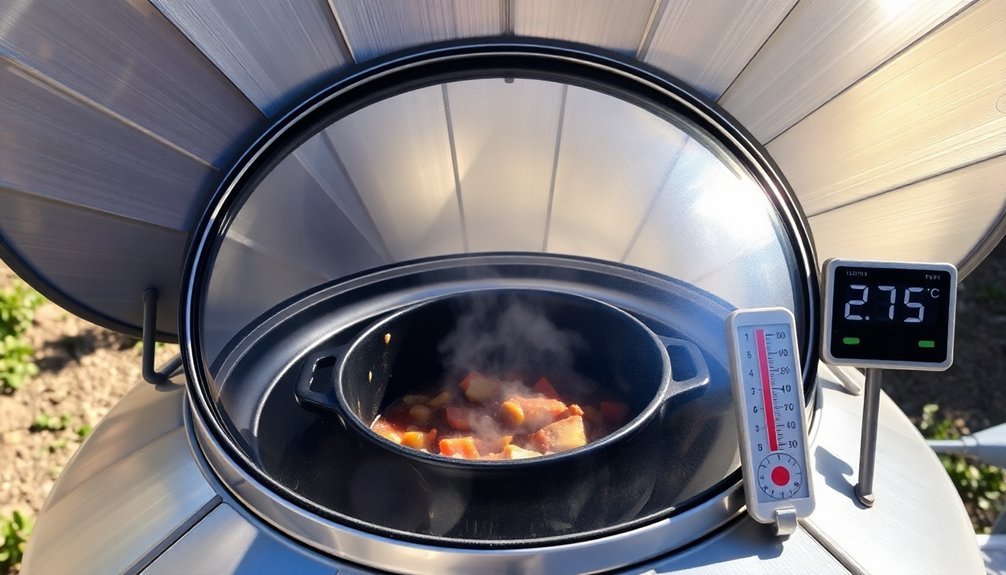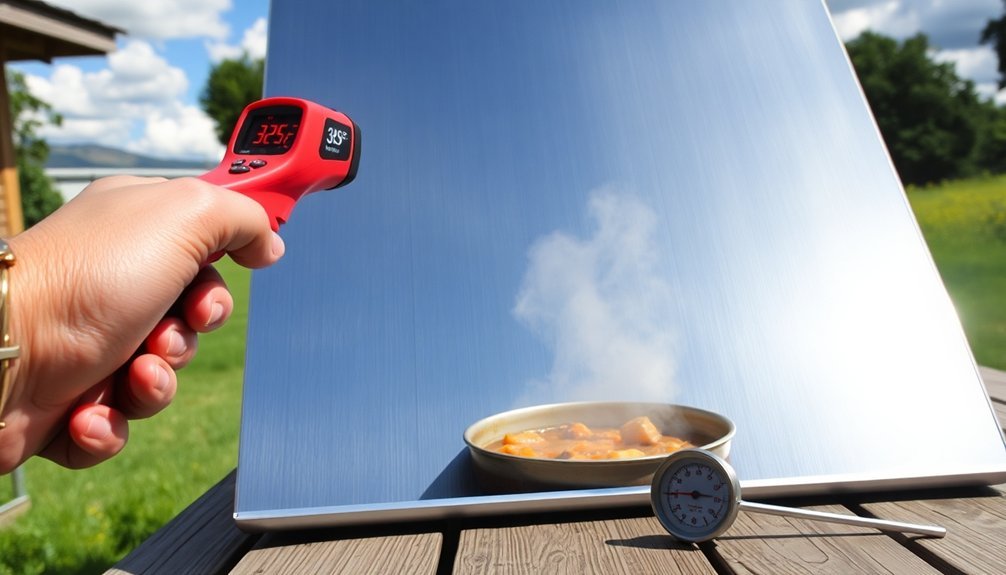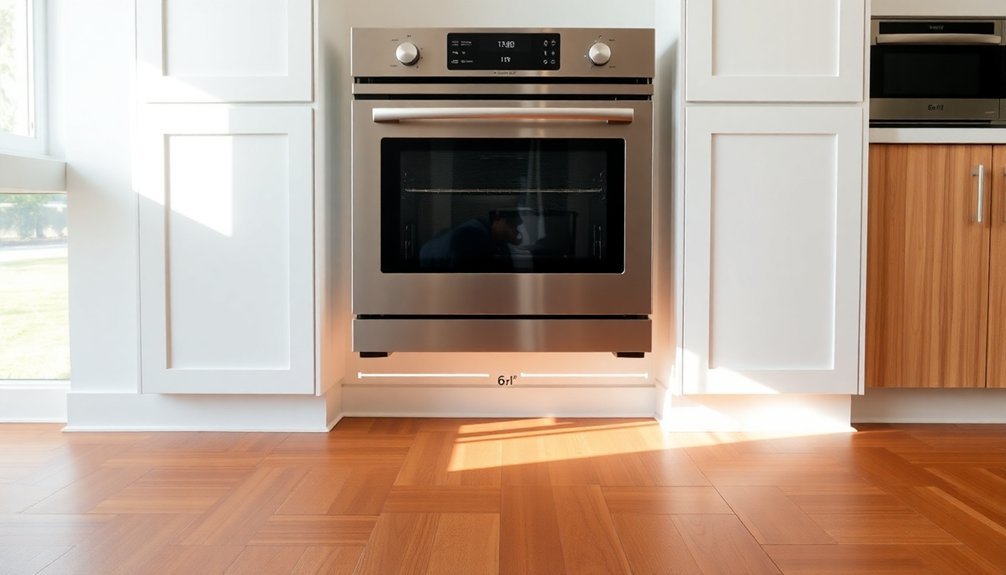When marinating proteins for sun cooking, you'll need to follow strict safety protocols to prevent bacteria growth. Always store marinating meat below 40°F until you're ready to cook, and use only glass or BPA-free plastic containers to avoid harmful chemical reactions. Don't reuse marinades that have touched raw meat unless you've boiled them for 5 minutes first. Keep your work area clean, use separate utensils for raw and cooked foods, and limit marination time to 24 hours maximum. Maintain proper temperature control throughout the process, and never leave proteins at room temperature for over two hours. These fundamental tips are just the beginning of mastering safe sun-cooking techniques.
Proper Storage Temperature Matters

Remember that marination doesn't extend your meat's shelf life.
For beef, pork, or lamb cuts, you've got 2-3 days total, including purchase and thawing time.
Keeping your marinating meat at just below 40°F ensures optimal food safety while allowing the flavors to develop.
Choose Safe Marination Containers
When choosing containers for marinating, you'll want to opt for either glass or food-grade plastic options, as both materials are non-reactive and won't affect your food's taste or safety.
While both materials work well, glass containers are typically more durable and won't retain odors or stains, though plastic ones are lighter and less prone to breakage. The Season-Serve Container uses a special 3D grid pattern to ensure even distribution of marinades across your proteins.
You'll need to avoid metal containers entirely, as acidic marinades can react with metal surfaces, potentially affecting both the flavor of your food and the safety of your marinade.
Glass Vs Plastic Containers
Selecting the right container for marinating can considerably impact your food's safety and flavor quality. Both glass and plastic containers offer distinct advantages for your marinating needs.
Glass containers won't react with acidic marinades and provide excellent visibility to monitor your food. They're durable, easy to clean, and can withstand extreme temperatures. You'll find they're perfect for long-term marinating without compromising food quality.
If you opt for plastic, choose BPA-free containers with secure seals. While lighter and more affordable than glass, they're ideal for shorter marinating sessions and outdoor use. The Tupperware Season Serve container is a reliable option with its generous 12.5-cup capacity for family-sized portions.
Look for containers with 3D grid patterns that enhance marinade distribution. Remember that plastic may wear out faster and can retain odors over time, so you'll need to replace them more frequently than glass alternatives.
Avoid Metal When Marinating
Metal containers pose significant risks when marinating food, despite their durability and widespread availability. When you're using acidic marinades, they'll react with metal surfaces, causing harmful compounds to leach into your food and create unwanted metallic flavors.
Additionally, scratched or pitted metal surfaces can harbor dangerous bacteria.
Instead, opt for food-safe plastic or glass containers. You'll want to choose BPA-free options with secure, snap-on lids to prevent leaks. Look for containers featuring built-in grids that help distribute marinade evenly across your food.
For convenience, select containers with clear walls and measurement markings. While marinating, always keep your container covered and store it on the bottom shelf of your refrigerator to maintain safe temperatures and prevent cross-contamination.
If you're transporting marinated food, use an insulated cooler with ice.
Avoid Cross Contamination Risks

Safety in marinating begins with preventing cross-contamination, which can lead to serious foodborne illness if not properly managed.
You'll need separate cutting boards, plates, and utensils for raw and cooked foods. Never reuse marinade that's touched raw meat unless you boil it first, and keep a clean portion reserved for basting cooked foods.
Store your marinated proteins in sealed containers below ready-to-eat foods in the refrigerator. Label containers clearly with contents, dates, and allergen information.
Keep your workspace clean by washing surfaces, equipment, and utensils with hot, soapy water after each use. When grilling, don't place cooked food on plates that previously held raw items.
Remember to keep foods out of the temperature danger zone (40°F-140°F) to guarantee safe consumption.
Time Your Marinade Right
While marinating can enhance flavors, knowing the right timing is critical for ideal results. For chicken and meats, start with a minimum of 15 minutes, though you'll get better results after 4-6 hours.
Don't exceed 48 hours, as this can make your proteins stringy. When it comes to seafood, keep it brief – no more than 15-30 minutes.
For the best outcome, store your marinating proteins in non-reactive containers like glass or ceramic, and always refrigerate for periods longer than an hour.
If you're using a plastic bag, place it in a container to prevent leaks. Remember to flip your proteins every 2-3 hours if they're not fully submerged.
When you want to use the marinade as a basting sauce, boil it first to ascertain it's safe.
Maintain Clean Preparation Areas

Keep your marinating station spotless by thoroughly sanitizing all surfaces before and after preparation, including countertops, cutting boards, and utensils.
You'll want to designate specific areas for raw meat handling and separate zones for other ingredients to avoid cross-contamination.
Don't forget to wash your hands frequently, especially after touching raw proteins and before handling other items.
Sanitize All Contact Surfaces
Maintaining a pristine workspace forms the foundation of safe marinating practices.
You'll need to follow a three-step process: clean, rinse, and sanitize every surface that comes in contact with your food.
Start by removing visible debris and wiping surfaces with a food-grade cleaning solution using a microfiber cloth.
Use hot water (at least 110°F) and scrape stubborn residues if needed.
Next, thoroughly rinse all surfaces with clean, hot water to remove any cleaning solution residue.
Finally, sanitize using either hot water (171°F or above) or a chemical sanitizing solution approved for food contact surfaces.
Let the sanitizer sit for the recommended time, then allow surfaces to air-dry completely.
Store your cleaned equipment and utensils in a clean, dry area to prevent contamination.
Prevent Cross-Contamination Areas
Protecting your food from cross-contamination requires a systematic approach to organizing your preparation areas. Keep raw meats, poultry, and fish on the bottom shelf of your refrigerator to prevent drips onto other foods.
You'll need to designate specific zones for raw and ready-to-eat items during both storage and preparation.
Use separate, color-coded cutting boards and utensils for raw and cooked foods. Don't forget to sanitize these tools thoroughly between uses.
When you're handling marinating liquids, store them in food-safe containers on the bottom shelf, and never reuse marinades without boiling them first.
Always wash your hands with warm, soapy water when switching between tasks, and consider using disposable gloves for an extra barrier of protection.
Remember to change gloves frequently, especially after handling raw ingredients.
Handle Leftover Marinades Safely
Safe handling of leftover marinades requires careful attention to prevent foodborne illness and guarantee ideal flavor preservation.
You'll need to boil any marinade that's touched raw meat for at least 5 minutes before reusing it as a sauce or for basting.
If you're planning to use the marinade later, store it in glass containers or food-grade plastic on lower refrigerator shelves at 40°F or below. Always label your containers with contents and preparation dates.
Don't keep marinades that have sat at room temperature for over 2 hours. Use refrigerated leftover marinade within 3-4 days and discard if it's been open longer than 4 weeks.
Watch for spoilage signs like unusual odors, colors, or mold. For best results, set aside a portion of fresh marinade before adding raw ingredients if you plan to use it as a sauce later.
Monitor Protein Temperature Zones

The temperature zone where you store and marinate proteins can mean the difference between safe consumption and potential illness.
You'll need to keep your marinating proteins below 40°F or above 140°F to avoid the dangerous "danger zone" where bacteria thrive.
Don't leave your proteins marinating at room temperature for more than two hours – after that, you'll need to discard them.
Instead, place your marinating container on the bottom shelf of your refrigerator to prevent any leaks from contaminating other foods.
While chicken and red meats need at least 15 minutes to marinate, seafood shouldn't marinate longer than 30 minutes.
For ideal safety, you can marinate proteins in the refrigerator for up to 24 hours, but make sure to keep the container sealed and fully covered.
Frequently Asked Questions
Can I Use Powdered Citrus Instead of Fresh Juice in Marinades?
Yes, you can use powdered citrus in marinades instead of fresh juice. While it won't give you the same vibrant flavor, it'll still tenderize proteins effectively and offers convenience with its longer shelf life.
Does Altitude Affect Marination Time for Sun-Cooked Proteins?
You'll need to increase your marination time at higher altitudes, since lower atmospheric pressure affects protein breakdown. Plan for 15-25% longer marination, just as you'd extend cooking times at elevation.
Should I Score Thick Proteins Before Marinating for Sun-Cooking?
Yes, you'll want to score thick proteins before marinating. It helps the marinade penetrate deeper into the meat, speeds up the process, and guarantees more even flavor distribution throughout your protein when cooking.
Can Herbs in Marinades Cause Sun-Cooked Proteins to Brown Differently?
While you'll get some herb flavoring, they won't greatly affect how your proteins brown in the sun. The browning process mainly depends on heat, amino acids, and sugars rather than the herbs themselves.
Are Glass Containers Better Than Plastic for Sun-Marination Methods?
Yes, you'll want to use glass containers for sun marination. They're safer since they don't leach chemicals, won't react with acidic marinade ingredients, and won't affect your food's quality when exposed to heat.
In Summary
You'll keep your sun-cooked proteins safe by following these essential marinating guidelines. Remember to store at proper temperatures, use food-grade containers, prevent cross-contamination, time your marinades correctly, maintain clean workspaces, handle leftovers properly, and monitor temperature zones. Don't take shortcuts with food safety – your careful attention to these practices guarantees delicious and safely prepared sun-cooked proteins every time.





Leave a Reply